Book I, Chapter 17: All Saints’ Day
List of Chapters | Previous Chapter
“I was there when you drew your first breath,” the woman whispered. “And I shall be there when you draw your last.” It was the voice of his mother. It was the voice of the werewolf of Mariahilf am Inn. “Little boy, little boy. . . Remember what I told you.”
He dreamed of the morning he and Henrietta were evicted from the apartment overlooking the Old Town square. The justice of the peace and his boorish son, Emil, had walked behind Hermann, who held Henrietta to his breast as he bore her over the cobbles in the direction of the Work Quarter.
Emil coughed. But the croak came out as a corvine caw, answered by the heavy flapping of wings, as a murder of crows flew up from behind the wooden shacks and stalls of Cronenberg’s Ostermarkt (Easter Market). For in his dream, this was also the morning of the massacre.
The three Alsatian maids stood on a mansard roof, playing violins whose discordant strings emitted only whimpers of anguish and the howls of a wolf. Imogene, the eldest, interrupted the music to point her bow, now dripping with blood, at Hermann, who was soaking wet from a thunderstorm that had vanished as swiftly as it had come. Though it was cold and gray in the streets of this nightmare city, the air was humid. Black beads of blood and bile rolled down Hermann’s brow, which he could not wipe away for fear of dropping his wife.
But Henrietta was no longer in his arms. It was his mother, Ilse. Hermann somehow stood apart from himself, watching as his mother folded his simulacrum into her arms. The factory bell summoned the workers to the evening shift. But Hermann stood, fascinated, watching as his doppelgänger yielded to the lascivious embraces of the witch. Ilse massaged her son’s abdomen, intimating with her eyes that she was proud of him. “You were supposed to die in the cradle,” she said, reaching into his trousers.
He felt the warmth of her hand on his member. And the horror of this incestuous violation so revolted him that he jolted awake.
The room was pitch black. It was night. How can this be? We buried Nanna only this morning. He inferred from the silence outside the window that it was after midnight, and that the evening shift had departed for the factory. He presumed that he had overheard the factory bell in his sleep, and that the sound had been woven into the fabric of his nightmare. Hermann had intended to go report to work that night, even though the Widow Schorn had exempted him from his duties for one more night.
Still numb from the vapors of sleep, he had not noticed upon waking the featherlight pressure of a slack hand resting on his inner thigh. He sprang from the rush mat and ran to the squat table, whose lineaments he was now able to discern as the fullness of consciousness returned to him.
Probing for the matchbox, he removed one and struck it; but when it blossomed into light he was so dumbfounded by the vision before him that he dropped the match and stomped on it with one bare foot. With trembling fingers, he removed a second match, and, striking the sulfur against the grain, touched the flame to the wick of the tallow candle in the tin dish. He raised the dish so that he could survey what lay on the floor beneath him.
“Mary, Mother of God! My sweet wife! What has happened?!”
On the floor beside the mat lay the naked upper torso of Henrietta Tischler. Her eyes were open and a maniacal rictus overspread her dead countenance. Beneath her ribcage was a mangled pulp of flesh and entrails—one of her legs had been torn off, while the other remained clinging to the corpse’s hip by a tattered strip of flesh.
Beneath the gory floorboards, he heard the door to the Widow’s private chambers thrown open, followed by her footfalls on the steps. Hermann looked down at his nightshirt, black with Henrietta’s blood.
The door swung open. There was a hubbub on the landing, as the other married tenants emerged from their rooms, whispering frantically to one another.
Greta Schorn had no source of illumination with her. She stepped inside, wearing a cotton shift and nightcap. She squinted in the dim glow of the candle. When she saw what lay on the floor, she touched her breast.
“Herr Tischler. . . In Christ’s name, what have you done?”
“I swear to God,” Hermann quailed, “I did not lay a hand on her!”
“Clean yourself!” the Widow hissed. She stepped from the room, shouting to the tenants in the corridor: “I command you all to return to your rooms, barricade the doors, and do not talk!”
Hermann knew why she had issued these directives, and had refused to elaborate on the gravity of the situation. She did not want a general panic. She would wait until Hermann had been apprehended and removed from the premises before sharing this information with the workhouse’s residents.
I’m going to be hanged, Hermann thought. That’s what the monster wanted all along. That’s how we killed. . . it. Again, he was a boy watching the execution, as the smiling cannibal swung on the gibbet.
Hermann’s roving eyes fell on the mangled remains of what had been his beloved wife. He staggered to the window to throw it open, but became sick before he could do so—vomiting on the ropes that had been used to secure Henrietta to the cushioned chair earlier that morning, before he had lain down to sleep.
He cracked open the window when he heard the Widow standing outside, waking the sentry.
“Notify your commander that one of my tenants has murdered his wife.”
The heavyset man rose from the bench he slept on, and ran in the direction of the gatehouse as fast as his large girth would permit.
Hermann addressed the corpse without looking at it. “If I don’t flee, my love, I won’t be able to avenge your death or prove my innocence.” In the intensity of the moment, there was no conviction in his voice. He was insensible to what he was saying.
He began to wonder if he was a somnambulist, and had in fact committed this grisly crime in a trance.
“No!” he affirmed. “I could not have done this to Henrietta!”
Hermann’s father had taught him that in moments of crisis it was imperative to do, not think. If he were to shut down, all would be lost. So he pulled on his trousers and tucked his bloody nightshirt in, and quickly buckled the belt. There would be no time to put on boots or lace them up; and the heaviness of the leather, were he to attempt to carry the boots with him, would only throw off his balance as he ran.
Clenching and unclenching his fists, he scanned the room for portable items that might be of utility.
On a peg by the door hung a canvas shoulder bag. He seized it and stuffed his father’s shaving mirror and straight razor into it. As a superstitious afterthought, he grabbed the memento mori that stood on the table and stuffed it into the bag as well, since his father’s spirit was somehow attached to it, as the séance had made abundantly clear.
Shouldering the bag, Hermann went to the door, leaving the candle guttering in the dish. He peered out into the corridor and saw all the doors shut, except Eva’s. A shadow moved at the threshold. He could not involve the girl any further in this catastrophe.
Quickly, he padded barefoot down the stairs. As he passed the double door to the Widow Schorn’s chambers, he heard the bolt shot through.
As he ran outside, Hermann mentally calculated how much time he had before he was pursued. The sentry would report the murder to his commander. The justice of the peace would be fetched; and someone would notify Maximillian, who was currently on the factory floor. Max would order all four alarms rung until a levee was raised.
To Hermann’s advantage was the fact that the Prussian military would be averse to having members of the levee, all of whom would be residents of the Work Quarter, straying too far from the slums out of concern that they, too, might attempt to flee Cronenberg.
Hermann would need to wade across the Wupper to conceal his footprints. Once he had crossed the river and traversed the slime pits, his pursuers would not be able to track him down. The only hunting dogs in Cronenberg were owned by wealthy men who maintained private kennels. They would not permit their prized hounds to be used for something so banal as chasing down a working-class murderer.
The dirt path outside Block 1 was deserted, as were both banks of the Wupper. The clang of tin pots carried from behind Block 2. This was the kitchen detail cleaning up after the midnight meal preceding roll call had been served.
So it is indeed after midnight. Hermann squinted at the moon, but it was muffled up in a thick haze and he could not determine the exact time.
“Hermann?” The voice was Eva’s.
He turned to her, wide-eyed. He thought Eva was inside, and that it was her shadow he had glimpsed at her threshold.
The girl held sheets and blankets to her chest. She had come from the alley between Block 1 and 2.
“What are you doing here?” he asked in an urgent whisper.
“I’ve taken these from the laundry house. Rolf and I are leaving within the hour.” She saw blood on his nightshirt.
“What has happened?”
“I. . .”
“Have you murdered my husband?!”
She lifted her gaze to the upper-story windows. There were lights and silhouettes moving agitatedly behind the curtains. Hermann had foolishly forgotten that the tenants upstairs, whom the Widow ordered to stay inside, would likely be looking out the windows. The ground floor contained only bricked-up frames where windows had once been.
Both Eva and Hermann were simultaneously drawn to the dim light in Hermann’s room. Eva dropped the sheets and blankets and screamed. An albino child with blood-smeared cheeks contemplated them from above, a grin on its cracked and ghastly lips.
To Eva’s horror, Rolf entered Hermann’s room. They could not hear what the young man was saying. But he had evidently come to investigate and make sure that the coast was clear before their intended escape.
Hermann saw Rolf calling out to the child. Then the young man turned his face toward where Henrietta’s body lay. He began to shake and gibber inaudible words, as he came closer to the demon at the window, who ignored him.
The child kept its eyes fixed on Hermann. Then its mouth opened and dilated until a hairless wolf snout oozed out from between its lips, ripping the nose in half.
Rolf screamed and Eva fainted. Hermann caught her in his arms.
When he looked up again, the werewolf stood at its full height, clutching Rolf’s paralyzed body between its monstrous hands. With a quick movement, the creature snapped the young man’s neck, and cast the body aside. Beneath its hairy chest hung the swollen teats of a nursing she-wolf; and where its navel should have been, Hermann saw a thick purple umbilical cord dangling down beneath the windowsill.
Now all the residents of Block 1 were shrieking and crying out, not knowing what was going on in the room at the end of the corridor.
Hermann knew it would be impossible for him to flee with Eva, but he had to get her to safety. He picked her up and carried her to the river, stumbling down the embankment. He felt the water rise to his midriff. He kept her head above the current.
Behind him, all the windows of Block 1 and Block 2 facing the river were thrown open, and there was shouting: “It’s Hermann Tischler!” — “Do you see him over there?!” — “Who’s he carrying?!” — “He’s abducted Rolf’s wife!” — “Why is he fleeing?!” — “Rolf has been murdered!”
Hermann climbed up onto the opposite bank, which crumbled and fell away beneath his unshod feet. He snuck to the east wall of the factory, though in full view of the residents of Block 2. He laid Eva on the ground beside a stack of broken crates.
“Poor child,” he said to the unconscious girl. “I’m so sorry that you and your husband were. . . I don’t know what to say. I don’t know why I still live.”
Hermann stood up and fled in the direction of the slime pits. He stubbed his toe and landed on something sharp. The ground became spongy and labile, and he tripped and fell repeatedly. The fog was dense. The soles of his bruised feet were cut on branches, jagged rocks, and the occasional bones of a corpse under the tar and mud. He heard behind him what sounded like a four-footed creature closing in on him at a loping gait.
When he reached the far side of the field and stepped onto the solid turf of the ditch that rose up to the trees, he saw scores of shadowy figures emerging from the mist. He knew them all. They were victims of the demon. And on a low mound, presiding over the assembly, loomed the werewolf of Mariahilf am Inn.
By now Max had been alerted. He called out to Hermann from the fog. “Herr Tischler, I’ve known you for many years. You must return and face judgment for what you have done. Do not slink away like the proverbial thief in the night!”
Hermann spread his arms and turned to the werewolf. ”What more do you want from me?!”
The shade of Henrietta averted her eyes from Hermann, as if in shame. This enraged him. He shouted, so that even his pursuers could hear. “You’ve taken everything from me except my life!—So take it too!”
The creature tilted its head, seemingly amused at the irony of a mortal fleeing for his life, even as he begs to have it taken from him. But the monster’s exultation was reserved for what happened next.
The orphan boy, Walter, emerged from the mist and went to Hermann’s side. “Hermann?”
“Oh, no. . .” Hermann groaned. He could not look away from the demon. “The others were not enough?” He saw in an instant what would happen. Walter would be hanged as Hermann’s accomplice.
The boy could not figure out whom Hermann was speaking to, but he remained steadfast and calm. Hermann looked down at Walter, and asked listlessly, “Where have my spiritual allies gone?”
Walter saw the blood on the nightshirt, but did not recoil from it. Instead, he reached for the fugitive’s hand, because, in his heart, he was certain that Hermann was guiltless of whatever had brought him to this situation. All the orphan boy knew was that the only man in the world who had ever treated him with kindness was suffering and needed comfort; and, by this selfless act of charity, Walter set into motion something extraordinary.
The shades in the tree line began to yelp and howl in pain. They crouched on all fours and ran to the werewolf, springing into the beast’s chest, since they were merely aspects and extensions of him. I am legion; for we are many.
Surprised by what was happening, the werewolf began to shrink.
The last of the apparitions paused before Hermann, rising to assume the shape of his witch mother, Ilse. She remained a slave to this diminished creature standing on the mound. But the boldness in her dark eyes was extinguished. Eventually, she too leapt into the monster’s chest and was gone.
The werewolf leaned forward as if ill, and turned away from the spreading light that had appeared in the trees.
Hermann looked over his shoulder. He drew in his breath and fell to his knees.
At the top of the ditch, backlit against a coruscating halo of light, stood the angelic form of Henrietta Tischler. Hermann’s father, Moritz, appeared on one side of her, and on the other was Hermann’s guardian angel, Walter, the father of Nanna. Behind the trio lingered Oma Ingrid, holding baby Erika, along with Hermann’s children, Charlotte and Frank, who smiled at him.
There were others besides. Corresponding to each of the false shades that had been in the tree line moments before, there now stood their luminous and true spirit in its place: Nanna, Rolf, the groundskeeper Karl, Berthold and Ursula Landecker, Aunt Magda, all the villagers of Mariahilf am Inn. Everyone who had perished at the hands of the werewolf had returned. Only Hermann’s mother, Ilse, was absent.
“Breathe,” Walter said, placing his hand on Hermann’s heart.
As he exhaled, the vision of grace that had been disclosed to him faded away. The beams of the veiled moon cast their sallow light over the naked treetops and roots protruding from the walls of the ditch.
Hermann thought again of what Henrietta had told him on Palm Sunday, 1867. The Devil triumphs when a good man is brought to despair. And there was Papa’s admonition from the grave: You must fight this thing, and never lose hope. As for “this thing,” the werewolf of Mariahilf am Inn, it too had disappeared. A coil of smoke hovered over the eminence where it had stood.
Hermann rose, and embraced the orphan boy. “Thank you.”
A row of lanterns began advancing over the slime pits. It was the levee.
Walter whispered to Hermann. “If we stay together, we’ll be fine. But we must leave.”
They climbed the ditch, fleeing north through the woods until they reached a field at the boundary of Cronenberg. They knew that no one would follow them past this point.
It was only now that Hermann could weep. He realized that everyone from his past who had made his life sweet and given color to his days was gone; and that his life going forward would taste of bitterness—and the days to come would be as a continuous and colorless night.
But he sensed that the souls of his loved ones were free, because the spirit of Henrietta Tischler had broken the spell of the werewolf. It was impossible for him to prove that this was true; but, in his distracted state, it was impossible for him to believe otherwise.
Hermann and Walter continued on their way, passing through many fields and pastures, until the first glimmers of dawn appeared on the eastern horizon and signaled the advent of All Saints’ Day.







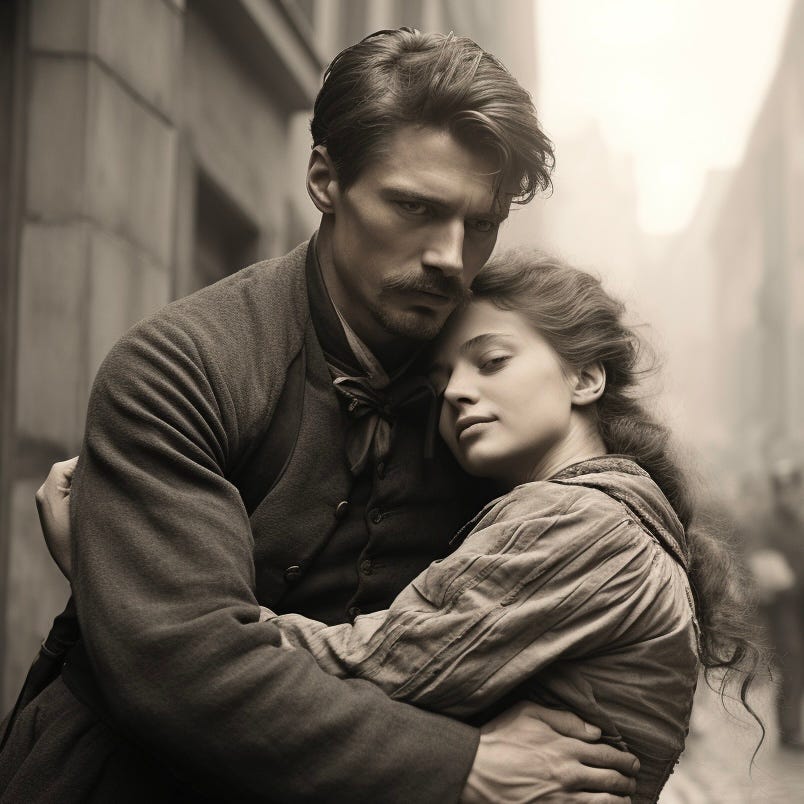
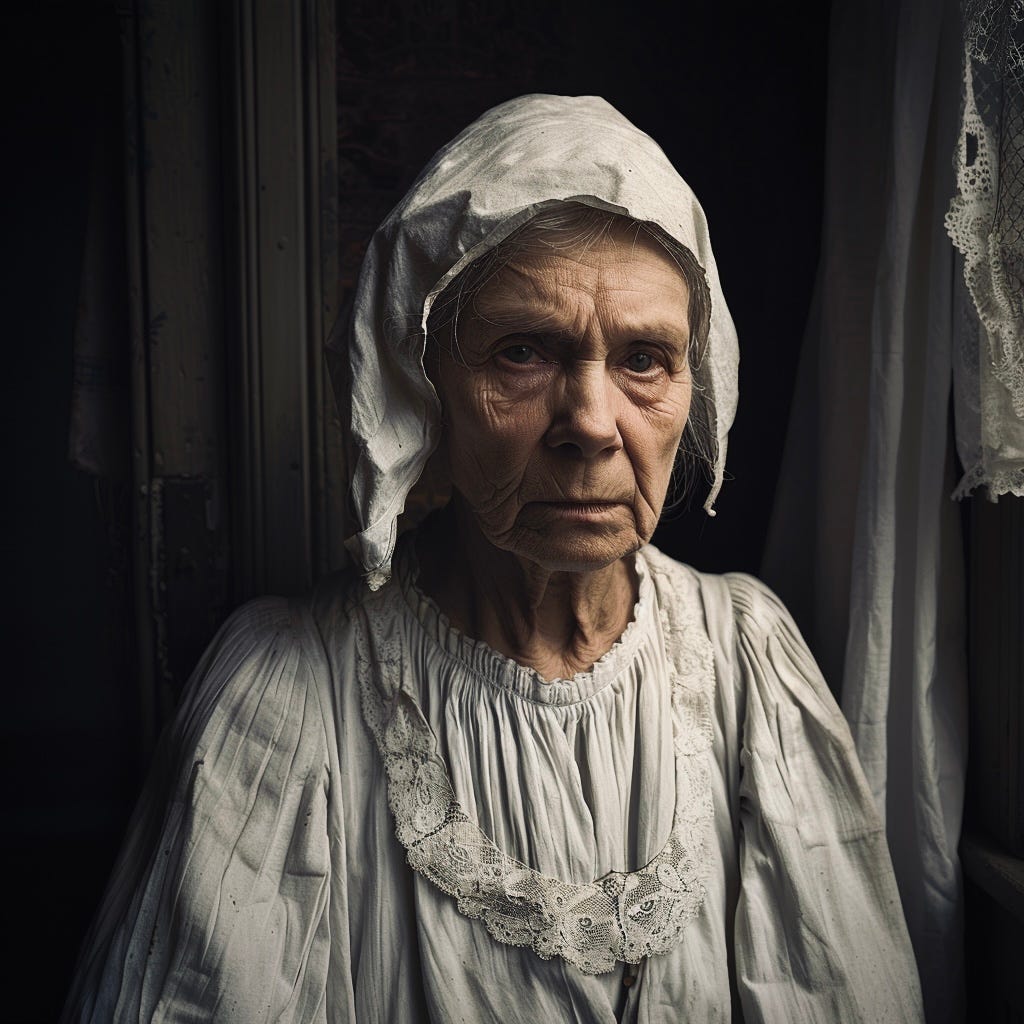
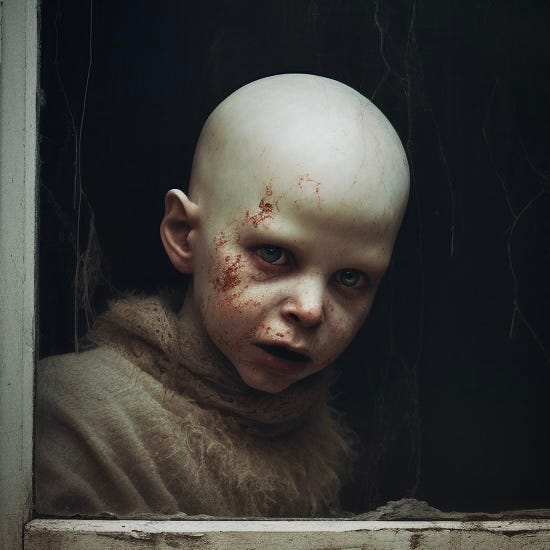

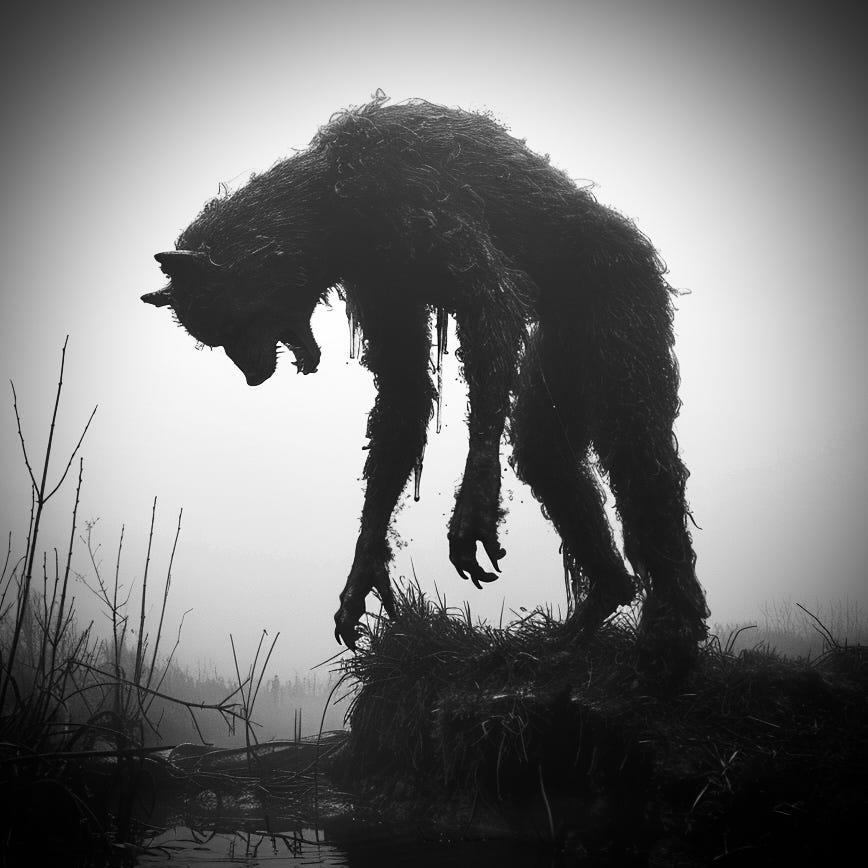

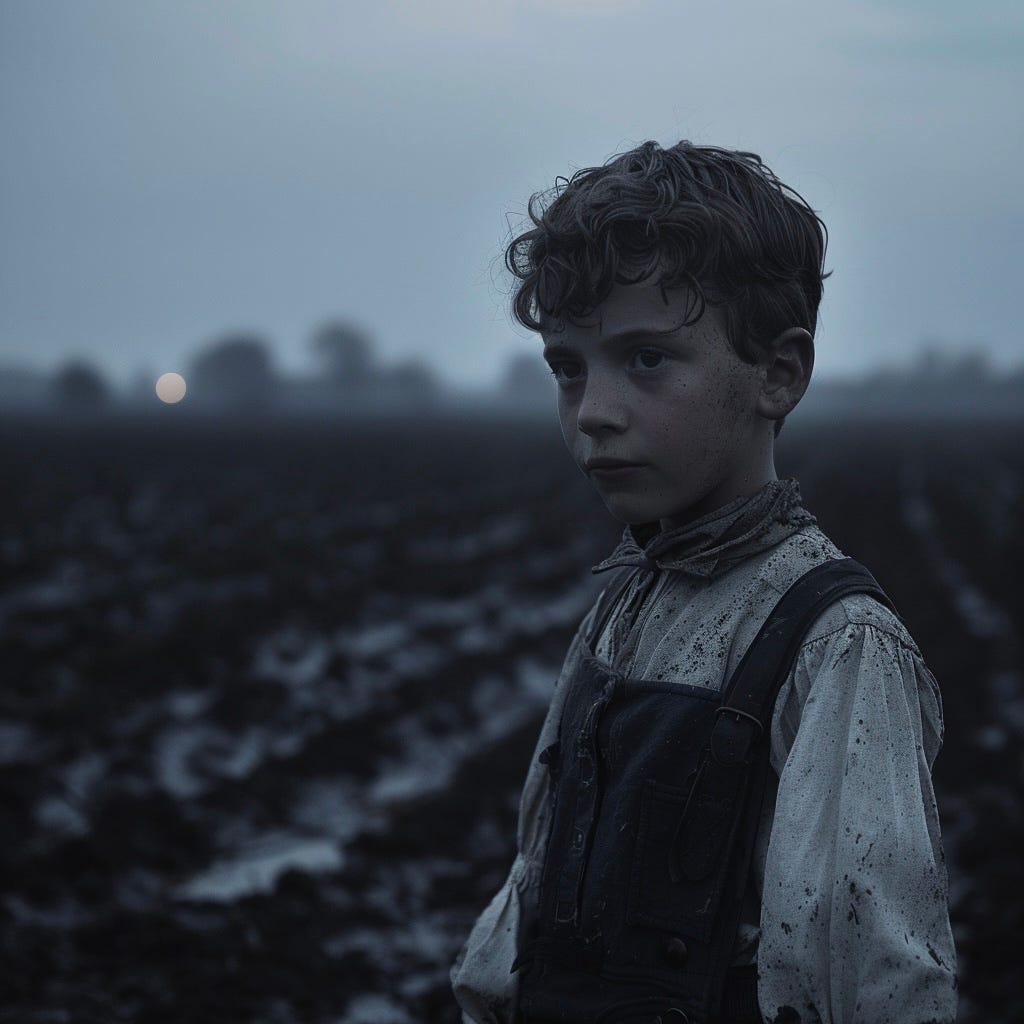
Great atmospherics again, Daniel.
Wow!!! I can't wait to see this tied together in a single book!